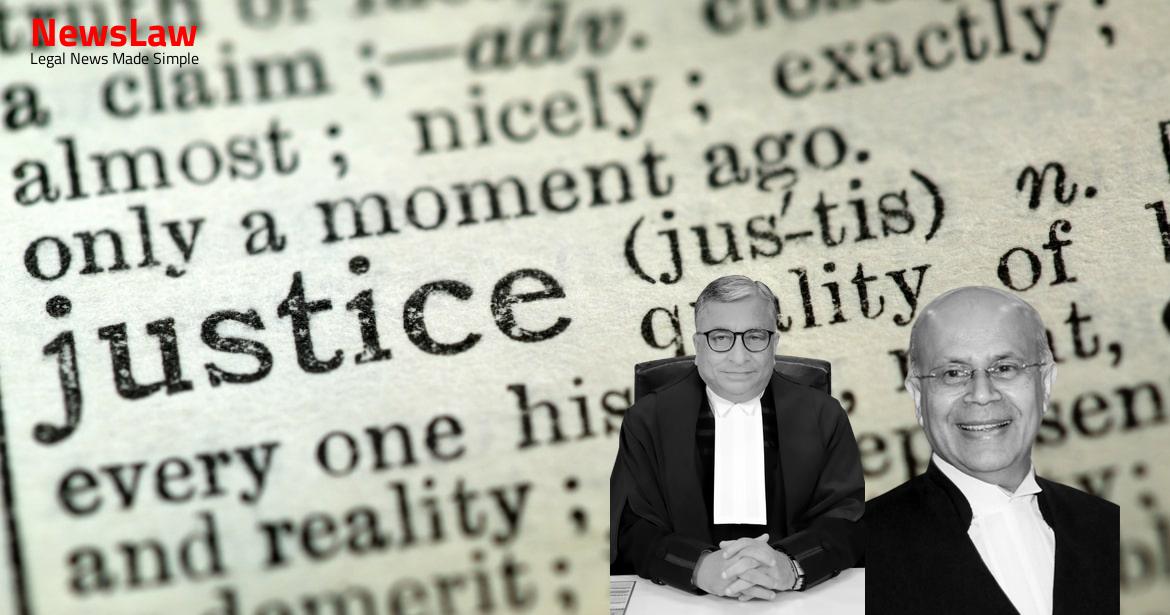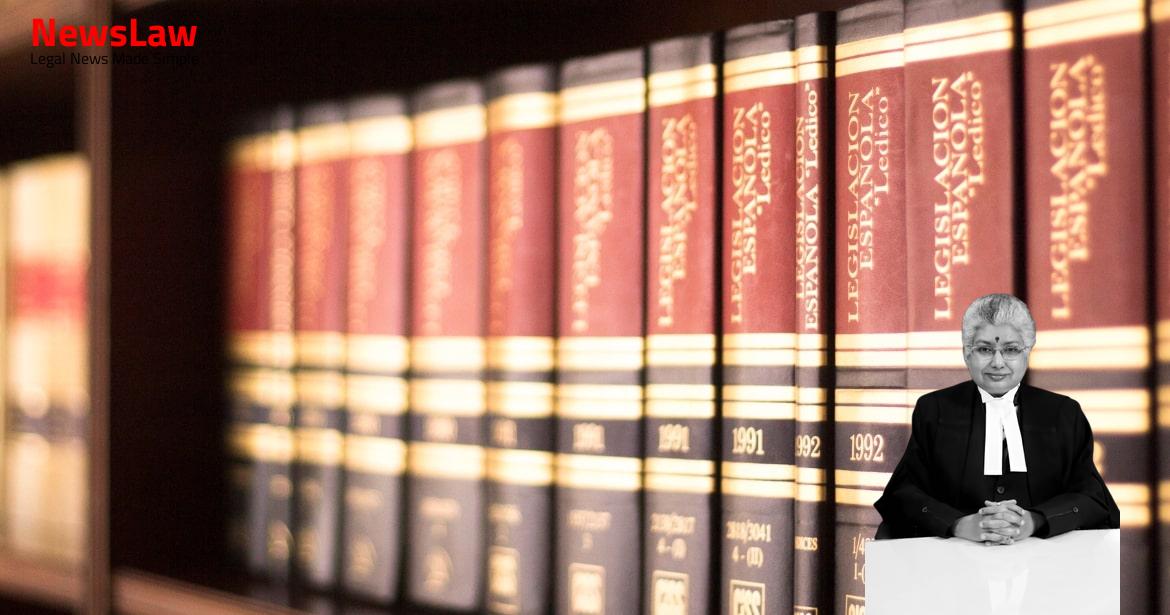In the legal case between the Appellant and Respondent, the High Court recently made a decision regarding the quashing of the charge sheet and criminal proceedings under the Dowry Prohibition Act. The case involves allegations under Section 493 of the Indian Penal Code and Section 3/4 of the Dowry Prohibition Act. Stay updated on the latest development in this case.
Facts
- The First Information Report was lodged by Respondent No. 2 against the appellants under Section 493 I.P.C. read with Section 3/4 of the Dowry Prohibition Act.
- Appellant No. 2’s marriage was settled with another girl for a handsome amount of dowry, leading to the lodging of the First Information Report.
- Subsequently, appellants started demanding a dowry of Rs. 5 lakhs after the FIR was lodged.
- A dispute between the parties was reportedly compromised at the Mahila Thana after the Inspector Incharge summoned both parties.
- The appellants alleged a change in behavior from the complainant’s family after the wedding expenses were to be shared equally as settled.
- A complaint was made against the appellants with a demand of Rs. 10 lakhs, accompanied by a threat to implicate them in a false case.
- Appellant No. 2 filed an application under Section 156(3) CrPC against the complainant and family members.
- Thereafter, Appellant No. 2 started frequenting the complainant’s house and misled his daughter, Jyoti, about the finalized marriage.
- Allegations in the FIR suggest that Respondent No. 2 proposed the marriage of his daughter, Jyoti, to Appellant No. 1.
- A charge sheet was filed against the appellants after investigation by the concerned Police Station, which was challenged in the High Court under Section 482 CrPC.
- A compromise led to the appellants not pursuing the application under Section 156(3) CrPC.
- A complaint was made at the Mahila Thana, but no action was taken, before the FIR was filed about 10 months post-compromise.
- The marriage proposal was finalized after appellants visited Respondent No. 2’s house on June 30, 2013.
- Appellant No. 2 allegedly established a physical relationship with Jyoti on August 16, 2013, after inducing her to his room.
- A ring ceremony was conducted on July 21, 2013, setting the marriage date for November 19, 2013.
- The High Court found no justification for quashing the charge sheet.
- As a result, the petition was dismissed.
- This decision reaffirms the validity of the charge sheet.
Also Read: Challenges to Eyewitness Testimony
Arguments
- The appellant’s counsel argued that the High Court failed to acknowledge that a fresh criminal action cannot be initiated for the same cause of action settled by compromise 10 months earlier.
- The compromise was acted upon by both parties, indicating resolution and finality to the matter.
- The appellant vehemently emphasized that this crucial aspect was overlooked by the High Court in its decision.
- Highlighting the importance of the settled compromise, the appellant’s counsel aimed to demonstrate that initiating a new criminal action on the same grounds was legally untenable.
- The argument stresses the binding nature of the previously settled matter and the need to respect the agreement reached by both parties.
- Respondent’s counsel argues that the First Information Report was filed under Section 493 of the Indian Penal Code and Section 3/4 of the Dowry Prohibition Act.
- Both offenses mentioned are non-compoundable in nature and cannot be compromised.
- Respondent’s counsel refutes the appellant’s claim that the allegations in the FIR do not constitute any offense.
- The High Court’s dismissal of the 482 petition is defended by the respondent as not overlooking the legal nature of the offenses mentioned in the FIR.
Also Read: Interpretation of ‘Agreement to Lease’ in Land Tenancy Dispute
Analysis
- The offence under Section 493 of the Indian Penal Code requires the man to deceitfully cause a woman to believe she is lawfully married to him, leading to cohabitation.
- The allegations in the FIR do not establish the essential elements of deception and inducement required under Section 493 IPC.
- On the other hand, the charges under Section 3/4 of the Dowry Prohibition Act are specific and do not qualify for quashing due to the gravity of the offence.
- The power of compounding of offences under Section 320 is distinct from the quashing of criminal proceedings by the High Court using inherent jurisdiction.
- Non-compoundable offences like those under Section 3/4 of the Dowry Prohibition Act may not be quashed based on settlements between parties.
- The accusations of demanding dowry of Rs.5 Lakhs against the appellants constitute an offence under the Dowry Prohibition Act.
- The differentiation between compounding and quashing is crucial in understanding the High Court’s authority in criminal cases.
- Section 482 preserves the inherent powers of the High Court to prevent an abuse of the process of any court or to secure the ends of justice.
- High Court may use its powers under Section 482 to quash proceedings if a settlement between parties would lead to better relations and resolution of a private dispute.
- Offences for which the appellants have been charged are offences against society and not private in nature.
- Continuance of trial for serious offences is founded on the overriding effect of public interests in punishing persons for such offences.
- Section 493 of the IPC deals with the offence of deceitfully inducing a woman to believe she is lawfully married to a man, leading to cohabitation.
- To establish the offence under Section 493, it must be proven that the accused deceitfully induced the woman to believe she was lawfully married to him.
- The core elements of the offence under Section 493 include deceit causing a false belief of a lawful marriage and subsequent cohabitation.
- The High Court can quash proceedings under Section 482 even if the offence is non-compoundable, depending on the facts of each case.
- While considering whether to quash a proceeding based on settlement between the victim and offender, the nature and gravity of the offence must be taken into account.
- Serious crimes like murder, rape, and dacoity should not be quashed even if the parties have settled, as these offences have a significant impact on society.
- Deceit in Section 493 is defined as a false statement of fact made intentionally to be acted upon by another, causing harm when believed and acted upon.
- The High Court’s inherent power under Section 482 must be used to secure justice or prevent the abuse of court processes.
- Charge sheet under Section 493 IPC quashed due to lack of evidence of the offence
- Criminal proceedings under Section 3/4 of the Dowry Prohibition Act to continue as FIR discloses cognizable offence
- High Court’s order regarding Section 493 IPC set aside as it would be an abuse of process to continue prosecution without evidence of the offence
Also Read: Employer’s Duty in Ensuring Driver Competence: Legal Analysis
Decision
- Appeal dismissed in relation to the charge sheet under Section 3 read with Section 4 of Dowry Prohibition Act
Case Title: ARUN SINGH Vs. STATE OF U.P. (2020 INSC 163)
Case Number: Crl.A. No.-000250-000250 / 2020



